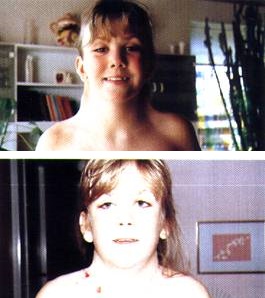特纳综合征
此條目可参照英語維基百科相應條目来扩充。 (2018年9月21日) |
| 特纳氏综合征 | |
|---|---|
 | |
| 經過頸部織帶手術前後的特納氏綜合症女孩 | |
| 类型 | 性腺发育不良[*]、X chromosome number anomaly with female phenotype[*]、疾病 |
| 分类和外部资源 | |
| 醫學專科 | 小兒科、醫學遺傳學 |
| ICD-11 | LD50.0 |
| ICD-10 | Q96 |
| DiseasesDB | 13461 |
| MedlinePlus | 000379 |
| eMedicine | 949681 |
| Orphanet | 881 |
透納氏症(英語:Turner syndrome,縮寫:TS),或稱 45,X / 45,X0(代表X染色體表达数);為基因疾患中性腺發育不良的一種,是雌性個體因X染色體部分或完全缺失而引發的疾病[1]。透納氏症患者的症狀各異,患者常常會有短而成蹼狀的頸部、低耳位、頸後髮際線較低、矮小,出生時即手腳水腫等特徵。一般來說,透納氏症患者因其性功能无法正常发育,会导致沒有月經、乳房不發育以及不孕,且会患有先天性心臟病、糖尿病以及甲狀腺功能低下症的機率較正常人高。大部分的透納氏症患者的智力水準正常,但許多患者的空間視覺能力低下,比如學習數學所需要的空間視覺能力[2]。透納氏症患者有視覺和聽覺障礙的機率也較正常人高[3]。
病因與診斷
[编辑]透納氏症並不是一種會遺傳自父母親的疾病[4]。目前所知沒有任何環境因素會導致此病症,同時也和媽媽的懷孕年齡沒有關係[4][5]。透納氏症主要肇因於染色體異常,為X染色體部份或整條有缺失或改變而致。大部分人擁有46條染色體,但患有透納氏症的患者卻僅有45條[6]。在某些情況下,染色體的異常現象只出現在部分細胞,而其餘則沒有,這就是透納氏症的鑲嵌現象[3]。在這樣的前提下,由透納氏症所引發的症狀就可能很輕微或甚至完全沒有出現[7]。診斷方式基本就是根據臨床症狀以及基因檢測[8]。
治療
[编辑]目前沒有任何已知的醫療方式可以治療透納氏症,但卻多少對於緩和病徵有些幫助。舉例來說,在幼童發育時期注射生長激素可以在之後的成人階段增加身高。雌激素替代療法能促進乳房以及臀部發育。在確定有哪些健康問題是由於透納氏症造成後,才開始考慮需要怎樣的醫療照護來加以控制[9]。
歷史
[编辑]產婦生出罹患透納氏症女童的機率大約介於1/2,000到1/5,000[10][11]。全球各地區與文化在透納氏症患者人數上基本相似,並沒有顯著的特異性[4]。透納氏症患者的平均壽命較一般人短,這是因為病患多有心臟方面的問題與糖尿病[3]。亨利·透納是第一個在1938年描述此病症的醫生,於1964年時,後人更進一步發現這是由於染色體異常所導致的疾病[12]。
參見
[编辑]- Gonadal dysgenesis, for related abnormalities,
- Other human sex chromosome aneuploids:
- 皮紋檢測
- 努南氏症候群
參考文獻
[编辑]- ^ Turner Syndrome: Overview. Eunice Kennedy Shriver National Institute of Child Health and Human Development. 2013-04-03 [2015-03-15]. (原始内容存档于2015-04-02).
- ^ What are the symptoms of Turner syndrome?. Eunice Kennedy Shriver National Institute of Child Health and Human Development. 2012-11-30 [2015-03-15]. (原始内容存档于2015-03-27).
- ^ 3.0 3.1 3.2 Sybert, Virginia P.; McCauley, Elizabeth. Turner's Syndrome. New England Journal of Medicine. 2004-09-16, 351 (12). ISSN 0028-4793. PMID 15371580. doi:10.1056/NEJMra030360.
- ^ 4.0 4.1 4.2 How many people are affected or at risk?. Eunice Kennedy Shriver National Institute of Child Health and Human Development. 2012-11-30 [2015-03-15]. (原始内容存档于2015-04-02).
- ^ Michael Cummings. Human Heredity: Principles and Issues. Cengage Learning. 2015: 161 [2016-06-28]. ISBN 9781305480674. (原始内容存档于2020-10-01).
- ^ Turner Syndrome: Condition Information. Eunice Kennedy Shriver National Institute of Child Health and Human Development. 2012-11-30 [2015-03-15]. (原始内容存档于2015-03-29).
- ^ What causes Turner syndrome?. Eunice Kennedy Shriver National Institute of Child Health and Human Development. 2012-11-30 [2015-03-15]. (原始内容存档于2015-04-02).
- ^ How do health care providers diagnose Turner syndrome?. Eunice Kennedy Shriver National Institute of Child Health and Human Development. 2012-11-30 [2015-03-15]. (原始内容存档于2015-04-02).
- ^ What are common treatments for Turner syndrome?. Eunice Kennedy Shriver National Institute of Child Health and Human Development. 2012-11-30 [2015-03-15]. (原始内容存档于2015-03-29).
- ^ Donaldson, M. D. C.; Gault, E. J.; Tan, K. W.; Dunger, D. B. Optimising management in Turner syndrome: from infancy to adult transfer. Archives of Disease in Childhood. 2006-06-01, 91 (6) [2022-11-01]. ISSN 0003-9888. PMC 2082783
 . PMID 16714725. doi:10.1136/adc.2003.035907. (原始内容存档于2018-08-03) (英语).
. PMID 16714725. doi:10.1136/adc.2003.035907. (原始内容存档于2018-08-03) (英语).
- ^ Marino, Bradley S.; Fine, Katie S. Blueprints Pediatrics. Lippincott Williams & Wilkins. 2013-01-22: 319. ISBN 978-1-4511-1604-5 (英语).
- ^ Kelly, Evelyn B. Encyclopedia of human genetics and disease. Santa Barbara, Calif.: Greenwood. 2013: 818 [2016-06-28]. ISBN 9780313387142. (原始内容存档于2021-03-09).
延伸閱讀
[编辑]- Bondy CA; Turner Syndrome Study, Group. Care of girls and women with Turner syndrome: A guideline of the Turner Syndrome Study Group. J Clin Endocrinol Metab. 2007, 92 (1): 10–25 [2016-06-28]. PMID 17047017. doi:10.1210/jc.2006-1374. (原始内容存档于2011-03-17).
